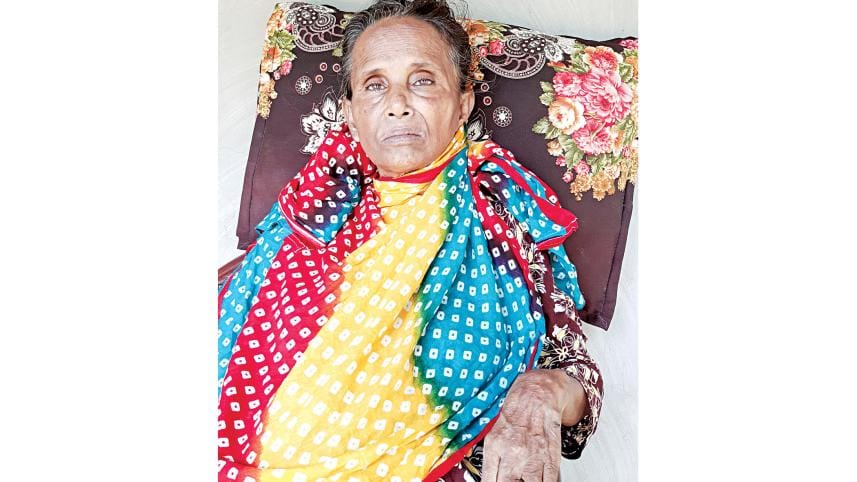Half a century with a shrapnel in her skull

Young Nurjahan Begum and Nuru Mia got married in early 1971.
Inhabitants of a small village in Akhaura, they lived in a tiny house, but the couple never stopped dreaming of big achievements in life. Then the war for independence broke out.
Nuru was adamant to join the Mukti Bahini, a decision Nurjahan supported.
After Nuru left home to take part in the war, Nurjahan's father, mother, and two younger siblings moved in with her.
On April 28 -- to this day half a century ago -- the Pakistan occupation forces launched an attack in their area. The enemy kept on firing mortar shells at the village and one of the shells exploded in their backyard.
Nurhajan's family members died on the spot while she got seriously injured in the attack. Pieces of shrapnel penetrated her arm, leg and left side of the head.

Nurjahan, now 70, is still carrying those fragments of violence unleashed by the occupation forces in her cranium. She continues to face several complications and remains almost in a comatose state these days.
She now lives with her children in West Gurabhui of Kulaura upazila.
"For the past three years, my mother's sufferings have intensified. She has been experiencing headaches and is often dizzy," said her daughter Amena Begum.
As her condition worsened, family members took her to see Dr Mohammad Sayed Inam Walid, a psychiatrist and assistant professor of Sylhet MAG Osmani Medical College Hospital.
"I did an MSE (mental state examination) and spoke to the family about the patient's medical history. When I learned about the shrapnel wound, I was shocked," he said.
"I wanted to know the details of the incident, but she could barely remember it," he said.
"I also did a skull X-ray, which showed the shrapnel lodged there," he added.
He said the shrapnel has affected the functioning of her brain for the last 50 years. Her condition is known as porencephaly.
Porencephaly is an extremely rare cephalic (relating to the head or the head end of the body) disorder involving encephalomalacia (softening or loss of brain tissue after cerebral infarction, cerebral ischemia, infection, craniocerebral trauma, or other injury).
Dr Walid said he also did a CT scan of her brain to determine if there were any other issues. The results showed extensive damages to her brain due to the shrapnel, he added.
"Surviving 50 years this way is a rare occurrence," he said.
He said surgically removing the shrapnel will be quite risky, and not to mention, expensive. He recommended taking her to Dhaka for better treatment.
During a recent visit to Nurjahan's house, she was found sitting in a corner, staring heavenward as her lips moved silently.
Her eldest son Mubarak Hossain, a Saudi expatriate, said he heard about what happened to her mother from relatives and local freedom fighters.
"My parents used to live in Akhaura back then. It was in April when Pakistan forces attacked and killed many freedom-loving Bangalees there."
"My mother's parents and siblings also died in the attack," he added.
"After my mother got injured, she was admitted to Agartala Hospital in Tripura. Father brought her back home after the war," he said.
Mubarak's younger sister Momota Begum said after the Liberation War, their father had to sell his only piece of land in Akhaura due to financial crisis.
"In 1976, we moved to Kulaura. As a landless family, we took shelter in Langla Khas land of Tilagaon union," she added.
Since 1996, their father started receiving honorarium as a freedom fighter and sent one of the five sisters abroad. The family later bought a piece of land in West Gurabhui and built a small house.
Nuru Mia passed away on June 2, 2019.
"In the beginning, mother used to limp around but she lost her mobility eventually. Recently, she has started to forget things. She even drank some pesticide mistakenly one day. So we took her to see Dr Walid," said Kohinur Begum, wife of Mubarak.
Asked, Bahar Mia Maldar, former commander of Akhaura upazila Muktijoddha Sangsad, said Nuru Mia fought for independence under Sector 3.
On April 28, 1971, Pakistan forces launched their first attack on Akhaura. Nurjahan got injured in their mortar attack, he added.
ATM Farhad Chowdhury, UNO of Kulaura upazila, said, "We have contacted the family and arranged an ambulance to take her to Dhaka for treatment."
Family members took Nurjahan to the capital on Sunday night.
They met with Dr Md Zahed Hossain, professor of Neurosurgery & Allied Departments, at the state-run National Institute of Neurosciences & Hospital in Sher-e-Bangla Nagar on Monday afternoon.
Contacted, Dr Hossain said, "We have admitted the patient and kept her under observation. We will form a medical board for her treatment soon."





 For all latest news, follow The Daily Star's Google News channel.
For all latest news, follow The Daily Star's Google News channel.
Comments